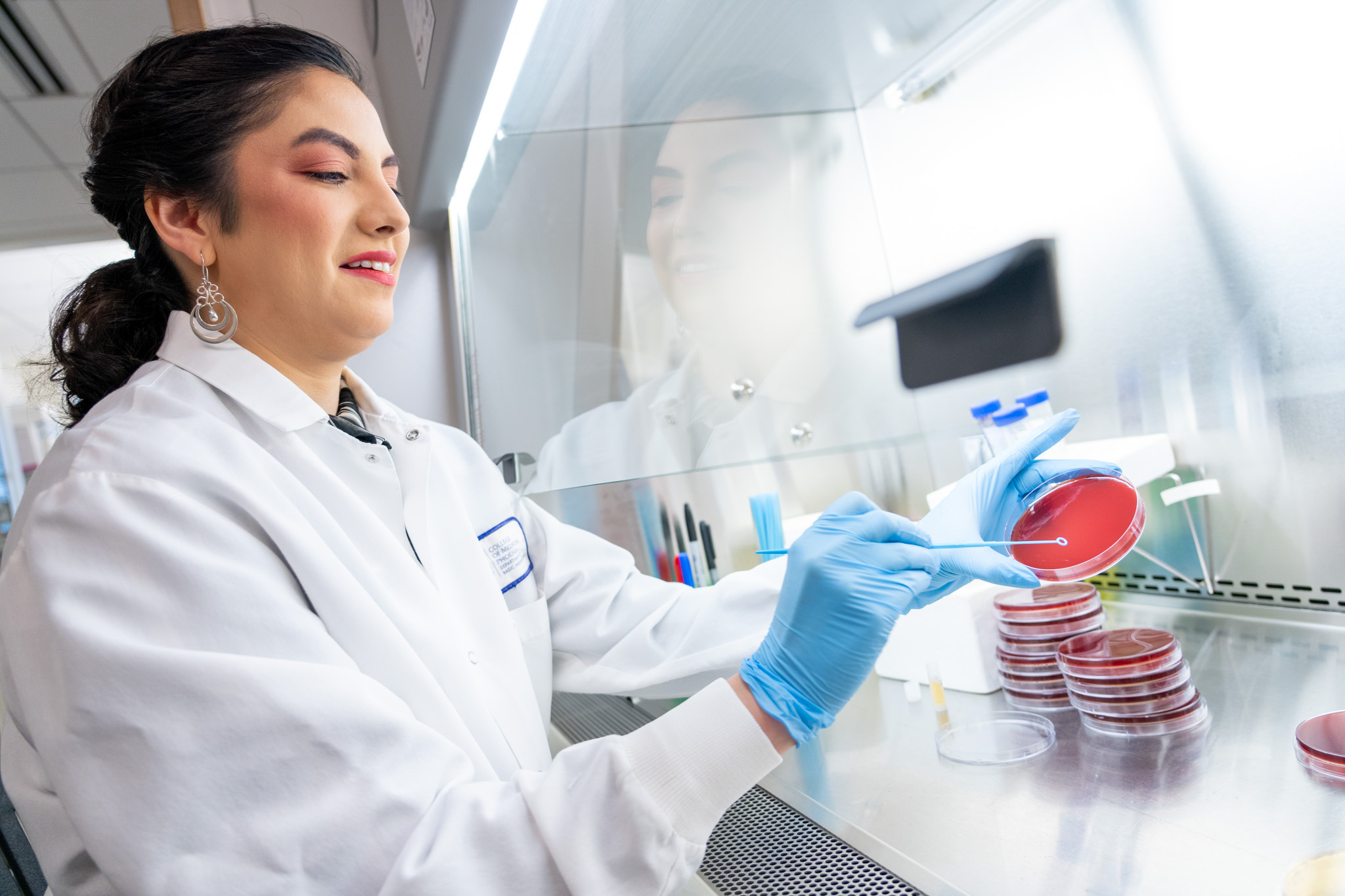
American Cancer Society Awards Grant to Postdoctoral Researchers

Nicole Jimenez, PhD, a postdoctoral research associate in the Department of Obstetrics and Gynecology (OB/GYN) at the University of Arizona College of Medicine – Phoenix, has received a grant from the American Cancer Society.
Dr. Jimenez’s research plan focuses on the relationship of endometrial bacteria with endometrial cancer and tumor characteristics using a previously collected Arizona endometrial cancer study conducted by the Melissa Herbst-Kralovetz’s, PhD, lab.
The research plan will also analyze the immunometabolic and oncogenic potential of two previously identified endometrial cancer-associated bacteria: F. vaginae and P. somerae.
“We are trying to better understand the pathophysiology, but also potential ways that we could modulate the microenvironment for better outcomes,” Dr. Jimenez said. “One of the things we are trying to assess is the microbiome's contributions to endometrial cancer progression and how it relates to advanced stages of endometrial cancer.”
Dr. Jimenez will supplement this research with additional experiments that focus on links between endometrial bacteria, tumor microenvironment, and endometrial cancer progression.
The American Cancer Society awarded 77 new postdoctoral fellowships between August 1 and December 31 of last year. Dr. Jimenez, who was awarded $147,500, was one of the select few awardees who were highlighted on the organization’s website.
The cause of endometrial cancer, which is cancer of the uterine lining, is not well-established. With this funding, Dr. Jimenez seeks to use clinical data and human 3D endometrial cell models to assess the effect of individual bacteria versus the polymicrobial cocktail.
“As a woman, I feel empowered about a lot of these conditions that don’t get highlighted as frequently or get a lot of research dollars to better understand treatments for them,” Dr. Jimenez said.
Additionally, endometrial cancer impacts Native American, Black, and Hispanic women disproportionately. According to a study published by the American Journal of Epidemiology, American Indian/Alaskan Native women had the highest increase of early onset endometrial cancer, with 4.8 cases per 100,000 people.
Black women had 3.3 cases, and Hispanic women had 3.1 cases, whereas white women had the lowest increase with 0.9 cases. The increase of endometrial cancer is a public health issue for women, but especially women of color.
“There are some hypotheses on the health disparities… some of those factors could be access to health care or lack of knowledge of symptoms associated with endometrial cancer,” Dr. Jimenez said. “Those are things that people have mentioned, but I think some of that research is still new.”
The Herbst-Kralovetz lab is currently evaluating differences in endometrial cancer incidence and stage at diagnosis. The microbiome may hold additional key insights.
Dr. Jimenez’s journey in microbiome research started with her undergraduate studies at Arizona State University, where she was introduced to gut microbiome research. Dr. Jimenez then applied to the Postbaccalaureate Research Education Program supported by the National Institutes of Health and moved to Virginia Commonwealth University (VCU) in Richmond, Virginia. VCU is where she began investigating the vaginal microbiome.
“We were evaluating what is a healthy microbiome, as well as the differences between women that gave birth at full term or preterm,” Dr. Jimenez said. “Our lab investigated specific differences between different strains of bacteria known to be pathogens.”
After completing her PhD, Dr. Jimenez moved to Phoenix and began working with Melissa Herbst-Kralovetz, PhD, an associate professor of Basic Medical Sciences and OB/GYN at the U of A College of Medicine – Phoenix.
“Dr. Herbst-Kralovetz focuses a lot on gynecologic cancers, host-microbe interactions, and other benign gynecologic conditions such as endometriosis,” Dr. Jimenez said. “Her work and health equity research interested me.”
Dr. Jimenez credits Dr. Herbst-Kralovetz, Paweł Łaniewski, PhD, assistant research scientist in the Department of Basic Medical Sciences at the college, and Ronald Heimark, PhD, associate professor for U of A’s pathology and cellular and molecular medicine departments, for supporting her throughout the grant application process.
She also highlights the U of A’s Native American Cancer Prevention as a supporting group in her application and mentorship on pilot research for the fellowship.
About the College
Founded in 2007, the University of Arizona College of Medicine – Phoenix inspires and trains exemplary physicians, scientists and leaders to advance its core missions in education, research, clinical care and service to communities across Arizona. The college’s strength lies in our collaborations and partnerships with clinical affiliates, community organizations and industry sponsors. With our primary affiliate, Banner Health, we are recognized as the premier academic medical center in Phoenix. As an anchor institution of the Phoenix Bioscience Core, the college is home to signature research programs in neurosciences, cardiopulmonary diseases, immunology, informatics and metabolism. These focus areas uniquely position us to drive biomedical research and bolster economic development in the region.
As an urban institution with strong roots in rural and tribal health, the college has graduated more than 1,000 physicians and matriculates 130 students each year. Greater than 60% of matriculating students are from Arizona and many continue training at our GME sponsored residency programs, ultimately pursuing local academic and community-based opportunities. While our traditional four-year program continues to thrive, we will launch our recently approved accelerated three-year medical student curriculum with exclusive focus on primary care. This program is designed to further enhance workforce retention needs across Arizona.
The college has embarked on our strategic plan for 2025 to 2030. Learn more.